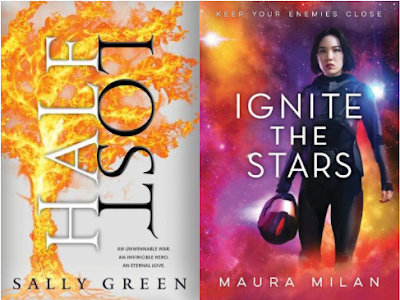My rating: ⭐⭐
From the cover:
"Molly Frost is FED UP...
Because Olivia was yelled at for wearing a tank top when she had to keep her sweatshirt wrapped around her waist.
Because Liza got dress coded and Molly didn't, even though they were wearing the exact same outfit.
Because when Jessica was pulled over by the principal and missed a math quiz, her teacher gave her an F.
Because it's impossible to find shorts that are longer than her fingertips.
Because girls' bodies are not a distraction.
Because middle school is hard enough.
And so Molly starts a podcast where girls can tell their stories, and soon her small rebellion swells into a revolution. Because now the girls are standing up for what's right, and they're not backing down."
Look, I finished it, so I gave it two stars and not one, but honestly...it's a letdown. I have been eager to read this book since it first popped up on my radar a long while back, but after an ok start it went downhill pretty quickly. Right off the bat I was not a fan of the structure, but that alone I could have lived with. Sadly, the characters were not believable (sorry, but I'm a youth services librarian, and I have never encountered an 8th grader who spoke like a grown-ass adult the way these students do), there were lots of weird tangential things brought in that made no sense, and more than anything, for a book LITERALLY CALLED Dress Coded, after the first few pages the policing of young female bodies at the main character's middle school started to feel like more of a side plot.
If I could recommend a more descriptive title, perhaps Carrie Firestone could have gone with Vaped to Death or Tales of a High School Vaper. Because holy gods. She obviously has a vendetta against vaping, which...ok, that's fine. I don't think anyone wants teenagers to start vaping. But the level of hysteria surrounding the vaping plotline throughout the book was so extreme that it veered into comical. I read this book out loud with my husband, and it literally became a joke we would make to each other - before we started reading, one of us would look at the other and say, "are you ready to hear about the horrors of vaping?" The melodrama was so ridiculous that toward the end of the book I couldn't get through the passages that talked about vaping without laughing.
Also, since the vaping storyline centered around the main character's older brother, can I just say that if you're going to build a storyline around an older sibling being so terrible that their younger sibling gets to go to a special group for kids dealing with traumatic events like a parent with cancer or a divorce and their mom has to quit their job to stay home and contain said sibling, you can't just tell me that they're terrible. You have to convince me. Like, he calls Molly and her friend Frog and Toad...oh nooooooooo! That just seemed like a Frog and Toad are Friends reference to me? She blackmails him into ordering pizza for her and her friends and he texts her to come get it? Wow, what an older sibling thing to do unrepentant dick!
I mean, I have several siblings, and a lot of his interactions with her seemed like fairly normal older/younger sibling stuff. If anything, she seemed to be much meaner to him than he ever was to her, and when at the end all their sibling problems are solved by Molly writing him a douchey note, I was like yeah...no. If he was that terrible he would have read the note, been like "lolol fuck you, sis," and thrown it away. Plus, for all the bemoaning middle schoolers vaping, there was never any acknowledgment that he was also a teenager who was addicted to vaping, so if we're having sympathy for the other kids struggling with addiction, perhaps we could spare a little of that sympathy for him too, instead of painting him as the irredeemable villain of a story about vap - oh, sorry, I mean dress coding.
At the end of the day, there was a lot of potential with this book, but it fell very short for me. The final nail in what was already a firmly sealed coffin was definitely that after spending 90% of the book crying about vaping and talking about girls getting dress coded for having their period or being tall, toward the end a Black student gets dress coded because a boy in her class touched her hair without her permission and then a trans girl reveals that she is being forced to follow the male dress code for their graduation ceremony. The first situation gets one more casual reference before the book is over, but they're both pretty much throwaway "oh yeah, and this happened also" dress coding examples, which was pretty frustrating after all of the still crappy but much less horrible examples. There was an opportunity to address some of the more fucked up examples of how dress codes are discriminatory, but instead we spent the bulk of the book hearing about vaping and how one girl got dress coded for having her period. 😐


